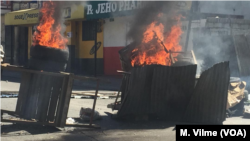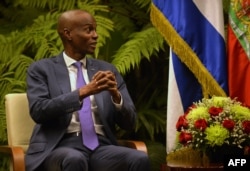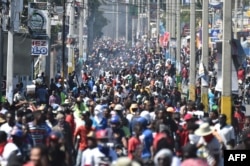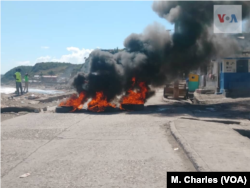Haiti is on fire — literally and figuratively.
Thousands took to the streets of the capital, Port-au-Prince, and other cities nationwide again Monday, calling for President Jovenel Moise's resignation.
"If they fire on us, we'll burn them!" angry protesters chanted, as they marched through the Delmas neighborhood of the capital.
Flaming tires and makeshift barricades were captured in photos and videos by VOA Creole stringers in the capital and in Cape Haitian (north), Jacmel (south), Hinche (center), Mirebalais (center) and Jeremie (southwest).
"We came out (to protest) on Oct. 17, Nov. 18, and no one listened. On Feb. 7, we said this has to end. We have decided to continue protesting until the Moise-Ceant government resigns," Michel Junior Blot, leader of the Sitwayen Debou (Citizens Standing) movement in Cape Haitian told VOA Creole. "And we don't just want them to resign, we want them to stay in the country and be judged for the crimes they have committed. Crimes against the people. "
Inflation and corruption are the main sources of the ire expressed by protesters for which they hold the president and prime minister responsible.
The government is accused of graft in connection with an oil deal signed with the government of Venezuela.
For months, protesters have been demanding transparency from the government regarding the alleged misuse of $3.8 billion. The money, due to Haiti under the PetroCaribe oil alliances signed between Venezuela and Caribbean nations starting in June 2005, had been earmarked for infrastructure and social and economic projects.
"There's nothing more for Jovenel to do in the country except for resigning to avoid a blood bath," lawyer Nathanael Lerine, who joined the protest, warned in an interview with VOA Creole in the southern city of Jacmel. "There is no place for Jovenel in the country anymore. All he does is lie. We need electricity 24/7. We need food on our tables instead of a leader who is lining his own pockets with cash. Inflation is rising— we've reached 100 Haitian Gourdes to the American dollar. Jovel has to go!"
A group of opposition lawmakers is echoing demands for Moise to resign. In a statement issued Monday afternoon, the lawmakers cited the fact that the president is mentioned in a corruption report regarding the mismanagement of PetroCaribe funds.
The lawmakers are proposing for Moise to be replaced by a transitional government tasked with improving living conditions for the people of Haiti, organizing a national sovereign conference, including participants from all levels of society, and organizing a trial for the PetroCaribe offenders.
In Port-au-Prince, a large crowd, estimated in the thousands marched toward Petionville, a suburb in the mountains not far from the president's private residence. Along the way, protesters broke windows, sacked gas stations and attempted to break into the National Bank of Credit, BNC. The national police, PNH ,arrived in time to stop them and make arrests.
Transportation was largely halted, except for motorcycles and pedestrian traffic in cities such as Cape Haitian, Jeremie, Hinche and Jacmel.
The government has been mostly silent so far, except for a warning on Feb. 7 by Justice Minister Jean Roudy Aly that anyone who participated in looting or damaging property would be punished. He reiterated that warning during a Monday afternoon press conference.
"We support all citizens protesting in accordance with the law as is their Democratic right. But anyone who participates in setting fire to property, damaging cars, will be found and punished. We can't accept that. We have measures to identify and find the culprits and arrest them," he said.
Meanwhile, the so-called Core Group, comprised of the United Nations Secretary-General's Special Representative for Haiti and ambassadors of the United States, Germany, France, Spain, the European Union and Brazil issued a communique stating that it has taken note of the demands made by protesters on Feb. 7 but deplores the loss of life and material damages incurred.
"The members of the group call on all actors in Haitian society, starting with the leaders, to engage in a constructive dialogue to identify and find realistic solutions to the political and economic crisis troubling the country," the statement said.
WATCH: Burning tires block Rue Docteur Hyppolite, a main thoroughfare in the city of Jeremie:
Regarding nationwide calls for regime change, the Core Group responded, saying, "We reiterate that in a democracy, change must be made through elections, not violence."
By Monday evening, protesters had dispersed, after police fired tear gas to prevent them from causing more damage in the capital and its suburbs.
On Tuesday, a U.S. State Department spokesperson for Western Hemisphere Affairs said in a statement, "We support the right of all people to demand democratic and transparent government and to hold their government leaders accountable, but there is no excuse for violence. Violence leads to instability, less investment, and fewer jobs."
Jaudelet Junior Saint-Vil in Fort Liberte, Yvan Martin in Cape Haitian, Wilner Cherubin in Jacmel, Renan Touissant in Port-au-Prince contributed to this report. Nike Ching at the State Department also contributed to this report.




